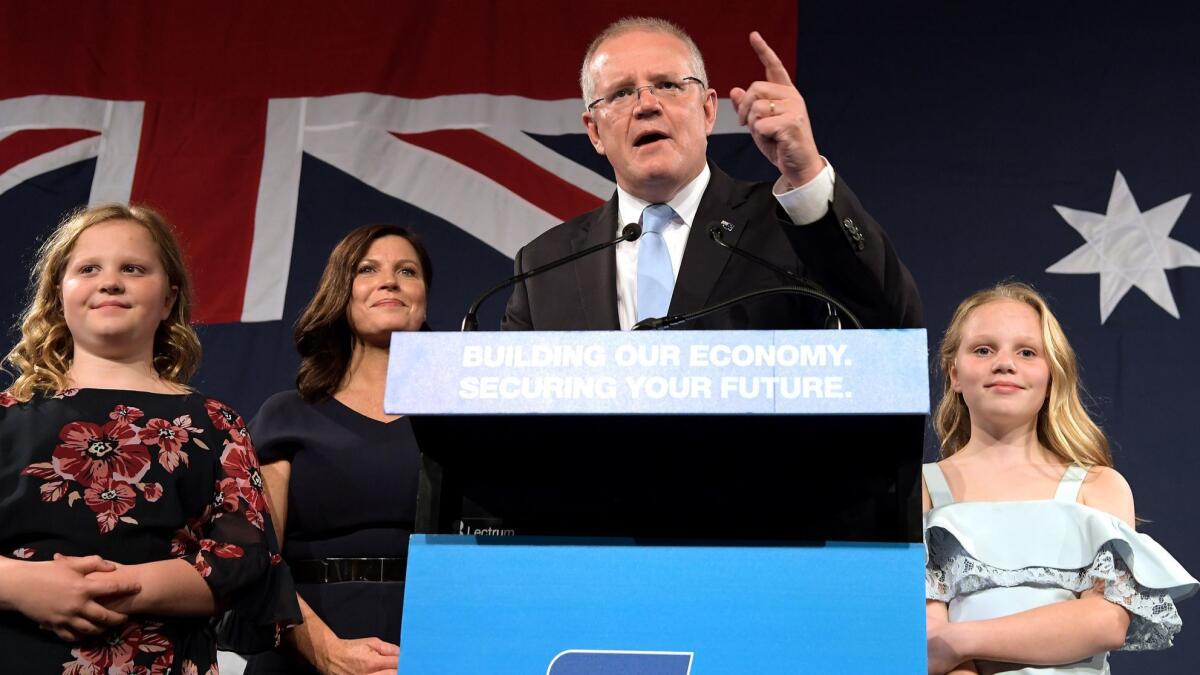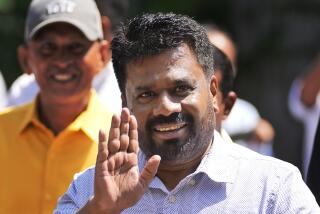Australia’s ruling coalition elected to surprise third term

- Share via
Reporting from CANBERRA, Australia — Australia’s ruling conservative coalition won a surprise victory in the country’s general election Saturday, defying opinion polls that had tipped the center-left opposition party to oust it from power and promising an end to the revolving door of national leaders.
“I have always believed in miracles,” Prime Minister Scott Morrison told a jubilant Sydney crowd.
Opposition Labor Party leader Bill Shorten conceded defeat late in the evening as Morrison’s Liberal Party-led coalition came close to a majority in the 151-seat House of Representatives, where parties need a majority to form a government. Vote counting was to continue Sunday.
“I’m disappointed for people who depend upon Labor, but I’m glad that we argued what was right, not what was easy,” Shorten told his supporters.
Shorten would have become Australia’s sixth prime minister in as many years. He said he would no longer lead Labor after six years at the helm.
The tight race raised the prospect of the coalition forming a minority government. The conservatives became a rare minority government after they dumped Malcolm Turnbull for Morrison in an internal power struggle last August. The government then lost two seats and its single-seat majority as part of the bloodletting that followed.
Pre-election opinion polls had suggested that the coalition would lose its bid for a third three-year term, and that Morrison would have one of the shortest tenures as prime minister in the 118-year history of the Australian federation.
Morrison had focused his campaigning on polling that showed while Labor was more popular than the government, the prime minister was more popular than Shorten.
Shorten, who campaigned heavily on reducing greenhouse gas emissions, said Saturday morning that he was confident Labor would win, but Morrison would not be drawn on a prediction.
Morrison is the conservatives’ third prime minister since they were first elected in 2013.
Tony Abbott, who became the first of the three conservative prime ministers in the 2013 election, conceded defeat Saturday in the Sydney seat he has held since 1994.
A maverick senator who blamed the slaughter of 51 worshipers in two New Zealand mosques on the country’s immigration policies also lost his bid for election.
Fraser Anning was the target of widespread condemnation for railing against Muslim immigration within hours of the mass shootings in Christchurch in March. He faced more criticism later for physically striking a teenage protester who cracked a raw egg on his head, and was censured by the Senate.
Senior Labor lawmaker Chris Bowen said his party may have suffered from what he conceded was an unusual strategy of pushing a detailed policy agenda through the election campaign.
The government has committed Australia to reduce its emissions by 26% to 28% below 2005 levels by 2030. Labor has promised a 45% reduction in the same time frame.
Shorten, a 52-year-old former labor union leader, had also promised a range of reforms, including the government paying all of a patient’s costs for cancer treatment and a reduction of tax breaks for landlords.
Morrison, a 51-year-old former tourism marketer, said he had closed Labor’s lead in opinion polls during the five-week campaign and predicted a close result.
Morrison promised lower taxes and better economic management than Labor.
Both major parties promised that whoever wins the election will remain prime minister until he next faces the voters’ judgment. The parties have changed their rules to make the process of replacing a prime minister more difficult for lawmakers.
During Labor’s last six years in office, the party replaced Prime Minister Kevin Rudd with his deputy Julia Gillard, then dumped her for Rudd.
More to Read
Sign up for Essential California
The most important California stories and recommendations in your inbox every morning.
You may occasionally receive promotional content from the Los Angeles Times.










